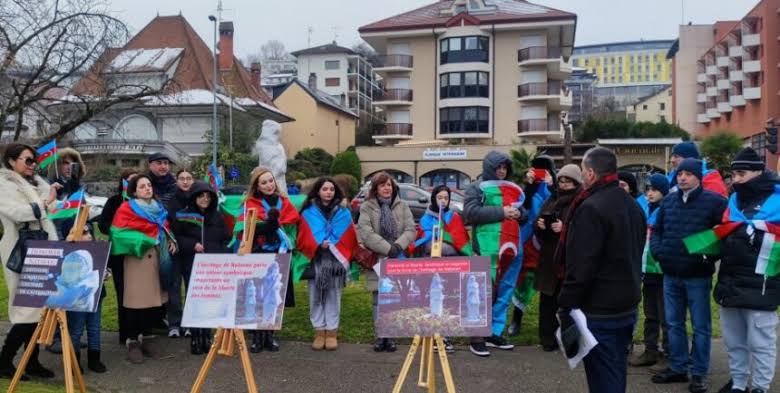Évian Rally Condemns Vandalism of Natavan Statue, Urges Heritage Restoration

The protest rally in Évian on January 13, 2024, organized by Azerbaijani and Turkish communities, reflects a collective denouncement of the recent act of vandalism against the statue of renowned Azerbaijani poetess Khurshidbanu Natavan.
The protestors, passionate about preserving Natavan’s cultural legacy, voiced demands for the restoration of the Azerbaijan Garden’s name and emphasized paying homage to the poet’s contributions to literary freedom and women’s rights.
Slogans such as “Let’s protect Natavan’s cultural heritage!” and “Preserve the heritage of the renowned Azerbaijani poetess Khurshidbanu Natavan!” underscore the protestors’ commitment to safeguarding the poet’s cultural significance. Additionally, the call for restoring the Azerbaijan Garden’s name reflects a broader concern for maintaining the historical and symbolic elements associated with Natavan’s legacy.
A poignant aspect of the rally was Ayten Muradova’s spotlight on the destruction of Khurshidbanu Natavan’s grave in Karabakh by Armenians, bringing attention to the global dimension of the issue and criticizing the lack of international awareness. This highlights the broader implications of cultural heritage preservation and the intersection of regional conflicts with cultural symbols.
Protestor Tarana Monbarbu’s characterization of the act in Évian as an assault not only on Azerbaijani culture but also on oriental and global cultural heritage adds a layer of universality to the protest, emphasizing the interconnectedness of cultural values and the impact of such acts beyond national boundaries.
Artist Asmar Narimanbayova, by highlighting the statue’s significance as a symbol of centuries-long cultural relations between Azerbaijan and France, underscores the depth of the vandalism’s impact on diplomatic and cultural ties. Her expression of dismay at the destructive intentions behind the act adds an emotional dimension, emphasizing the need to recognize the broader consequences of such actions.
The act of vandalism against the statue, a gift from Azerbaijan to Évian-les-Bains, which established sisterhood with Ismayilli in 2017, has elicited concerns not only among the Azerbaijani community in France but also within the local community. This suggests a shared sense of responsibility for the preservation of cultural heritage and a recognition of the importance of cross-cultural connections in fostering mutual understanding.
Conclusion
The protest in Évian represents a multifaceted response to the vandalism, encompassing calls for cultural preservation, condemnation of regional conflicts affecting heritage, and an appreciation of the broader implications on global cultural relations. The diverse voices within the protest underscore the complexity of cultural heritage issues and the need for international awareness and cooperation in addressing such challenges.


